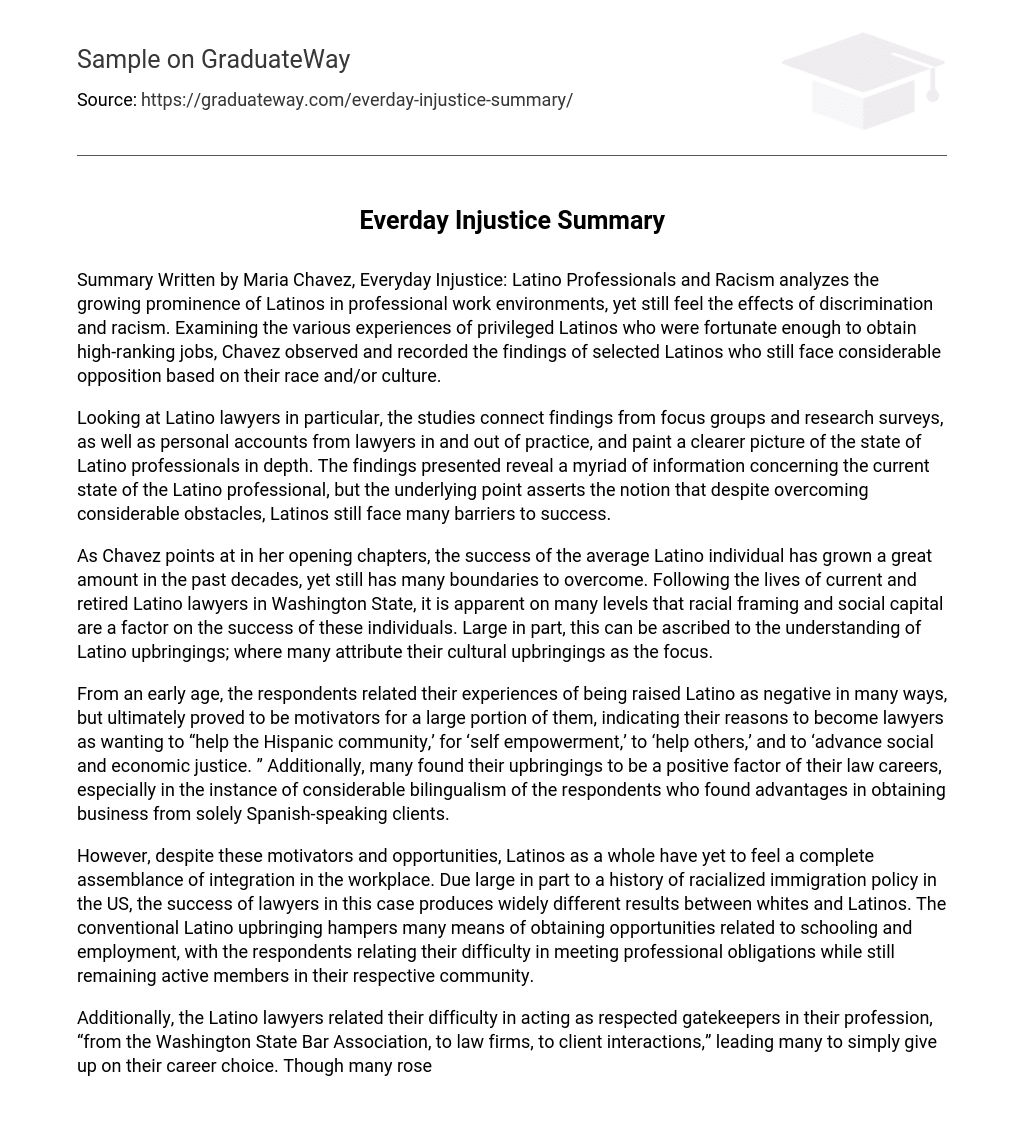Summary:
Everyday Injustice: Latino Professionals and Racism, written by Maria Chavez, analyzes the increasing presence of Latinos in professional work environments. Despite their success, discrimination and racism still affect them. Chavez studied the experiences of privileged Latinos who obtained high-ranking jobs and recorded the findings of selected individuals who continue to face significant opposition based on their race or culture.
When examining Latino lawyers specifically, studies combine results from focus groups and research surveys with personal accounts from both practicing and non-practicing lawyers to provide a more comprehensive understanding of the current state of Latino professionals. The findings presented reveal a wealth of information regarding the challenges faced by Latino professionals, ultimately highlighting the fact that despite overcoming significant obstacles, Latinos still encounter numerous barriers to success.
As Chavez points out in her opening chapters, the success of the average Latino individual has grown significantly in the past few decades. However, there are still many barriers that need to be overcome. By following the lives of current and retired Latino lawyers in Washington State, it becomes apparent that racial framing and social capital play a significant role in their success. This can largely be attributed to their understanding of Latino upbringings, where many attribute their cultural upbringing as the key factor.
From an early age, the respondents related their experiences of being raised Latino as negative in many ways. However, these experiences ultimately proved to be motivators for a large portion of them. They indicated their reasons for wanting to become lawyers as wanting to help the Hispanic community,” for self-empowerment, to help others, and to advance social and economic justice.
Additionally, many found their upbringings to be a positive factor in their law careers. This was especially true in the instance of considerable bilingualism among the respondents who found advantages in obtaining business from solely Spanish-speaking clients.
However, despite these motivators and opportunities, Latinos as a whole have yet to feel fully integrated into the workplace. This is largely due to a history of racialized immigration policy in the US. The success of lawyers in this case produces widely different results between whites and Latinos. The conventional Latino upbringing hampers many means of obtaining opportunities related to schooling and employment. Respondents relate difficulty in meeting professional obligations while still remaining active members in their respective communities.
Furthermore, Latino lawyers have expressed their struggles in being recognized as respected gatekeepers in their profession. This difficulty is present across various aspects of the legal industry, from the Washington State Bar Association to law firms and client interactions. Unfortunately, this has led many Latinos to abandon their career aspirations altogether. Despite this adversity, some have managed to rise above and succeed. However, it remains true that people of color must often exceed expectations to achieve success.
For Latina women, discrimination takes on a different form as both race and gender play significant roles in determining their success.
Latina professionals face additional obstacles, including expected family obligations, lower pay, and stagnant gender roles that their male counterparts do not have to endure. Despite these challenges, Latinos are making progress in the professional world thanks to those who have succeeded. Chavez notes that although they encounter significant obstacles, the Latinos in this study are success stories in many ways. This success has not only led to personal wealth and gains but also improved Latino communities.
Although this social capital is more skilled at working with whites, many Latino professionals are actively involved in various community and professional organizations. By focusing on law, readers can fully comprehend the impact these professionals have on the local community in terms of political awareness and participation. More importantly, they play a significant role in overall education – something that their families have only had limited access to. Access to higher education has provided many professional Latinos with the means to turn their lives around and do the same for those who share similar experiences.
Education is highlighted in these findings to emphasize its importance in providing pathways to success for disenfranchised Latinos. Aspirations and dreams can be strong for communities that lack inherited intellectual capital and wealth. However, achieving these goals requires policies such as affirmative action and greater acceptance of Latinos in education becoming commonplace in the United States. By focusing on professionals, the plight of Latinos is put into a different perspective, asserting that racism against this group is still very much alive.
Although there are individuals who have excelled and utilized their efforts to improve the well-being of their people, American society still exhibits persistent discriminatory practices that hinder their advancement. The stories of the respondents highlight this notion but also indicate that with an increased sense of awareness towards these issues and an emphasis on early education, the next generation of Latinos will begin to feel a greater sense of acceptance.





